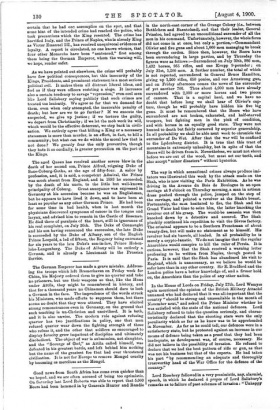Good news from South Africa has come even quicker than
we hoped, and we are often accused of being too optimistic. On Saturday last Lord Roberts was able to report that 5,000 Boers had been hemmed in by Generals Hunter and Rundle
in the north-east corner of the Orange Colony (is, between Bethlehem and Basutoland), and that their leader, General Prinsloo, had agreed to an unconditional surrender of all the men in his command. Unfortunately, however, the whole force did not come in at once, but only a portion,—Oommandant Olivier and five guns and about 1,000 men managing to break through the cordon. Since then, however, the Boers have been surrendering in large parties, and by Thursday the figures were as follows :—Sarrendered on July 30th, 986 men, 1,432 horses, 955 rifles, and one Krupp 9-pounder ; on July 31st, 1,200 men. A further number, the total of which is not reported, surrendered to General Bruce Hamilton, giving up 1,200 rifles, 650 ponies, and one Armstrong gun, and on Friday afternoon comes the news of the surrender of yet another 700. Thus about 4,000 men have already surrendered with 2,000 or more horses and two pieces of cannon. That is a capital haul, and we have no doubt that before long we shall hear of Olivier's cap. tare, though he will probably have hidden his five big guns. It must be remembered that the Boers who have surrendered are not broken, exhausted, and half-starved troopers, but fighting men in the pink of condition, and with horses in an equally good state. They were not hunted to death but fairly cornered by superior generalship. In all probability we shall be able next week to chronicle the surrender of De Wet. After that the war will be confined to the Lydenburg district. It is true that this tract of mountains is extremely unhealthy, but in spite of that the Boers will be driven from it. Nevertheless, we must not shout before we are out of the wood, but must set our teeth, and also accept "minor disasters" without hysterics.


































 Previous page
Previous page